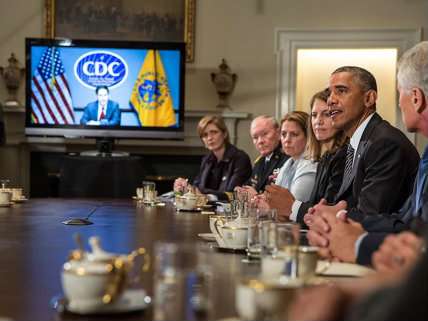The Problem With Blaming Obama For Ebola

Should Republicans and conservatives be blaming President Obama for the government's handling of Ebola? Plenty of them are, but that might not be a good idea, says Philip Klein of The Washington Examiner—at least not for those who would generally prefer a smaller and less activist government. Klein, citing National Affairs editor Yuval Levin, argues that pinning the blame on President Obama lends credence to the idea that the president should be at the center of all national issues:
Though there are fair criticisms of the CDC's handling of Ebola, by giving into the temptation to point fingers at Obama, Republicans run the risk of reinforcing the idea that any crisis or perceived crisis can be handled if only there were a better person in charge. And this could cut against many of the arguments that conservatives usually make about the inherent problems with federal bureaucracies.
Reacting to criticism of the handling of Ebola, Yuval Levin noted in a post over at National Review, "The attitude is premised on the bizarre assumption that large institutions are hyper-competent by default, so that when they fail we should seek for nefarious causes. Not only liberals (who are at least pretty consistent about making this ridiculous mistake) but also some conservatives who should know better respond with a mix of outrage and disgust to failures of government to contend effortlessly with daunting emergencies. But do we really expect (or even want) our government to have the power and ability to smooth all of life's edges and be ready in an instant to address the consequences of, say, a major hurricane or massive oil spill or deadly disease outbreak? What do we think that government would be doing with that power the rest of the time?"
One of the fundamental failures of Mitt Romney's 2012 campaign was that he didn't make a coherent, overarching, philosophical argument against big government. The impression Romney gave was that large federal institutions weren't necessarily innately flawed, but merely mismanaged. If only Americans elected Romney — the turnaround whiz who built businesses — to "run" the country, those institutions would perform well.
I think criticizing the Centers for Disease Control and Prevention (CDC) is basically fair, especially in light of some of its admitted mistakes and recent history of safety problems. The once-respected agency has taken a huge hit in public opinion recently, dropping from 60 percent public confidence in March of last year to 37 percent now. That's not unreasonable. The CDC should be doing a better job at this, its core mission.
But Klein makes a good point about criticism directed at President Obama. What can Obama, himself, really do? I suppose he can appoint (yet another) Ebola czar, but is yet another high-level federal issue-czar really what supporters of limited government should want? Most of the direct action in treating and preventing Ebola happens at the local level, with local authories and health providers making crucial calls. The administration can provide those local authorities with the flexibility and resources they need, but otherwise, especially at this stage, the best option is probably to stay out of the way.
A lot of the Republican calls for action, in contrast, have taken the opposite approach: We've seen Republicans call for travel bans to and from West Africa, and for massive efforts to tighten security at international entry points. GOP politicians helped lead calls for the installation of a new czar (despite opposing other czar appointments in the past). It's all just playing into the idea that if there's a problem, it needs to be a national emergency, possibly a panic, and the president needs to fix it.
